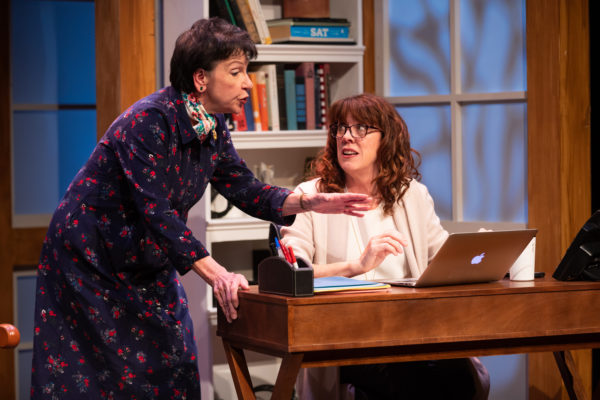Theater Review: “Admissions” — The Frustrations of the Privileged
By Daniel Gewertz
Admissions is a successful comedy, but not quite the hot, scathing satire of “privileged whiteness” one might gather from the ads. (Or from some of the local reviews.)
Admissions by Joshua Harmon. Directed by Paul Daigneault. Staged by SpeakEasy Stage Company at the South End / Calderwood Pavilion at the Boston Center for the Arts, Boston, MA, through November 30

Cheryl McMahon and Maureen Keiller in the SpeakEasy Stage Company production of “Admissions.” Photo: Maggie Hall.
You might call Joshua Harmon’s award-winning play Admissions a satiric situation comedy. Though a far cry from the apolitical nature of TV sitcoms, Admissions is stuffed with effective laugh-lines but weak on character development and ultimately dependent on a wacky plot device. The script tosses out a lot of intriguing perceptions about white privilege, white guilt, and white paranoia, but it neither condemns nor forgives. Admissions is content to poke fun. It’s satire-lite.
Harmon’s main character is the Dean of Admissions at Hillcrest, a respected but not especially prestigious New Hampshire prep school. Sherri Rosen Mason (a sturdy Maureen Keillor) is a middle-aged white liberal whose main ambition in her professional life is to boost her school’s nonwhite student body from 18 to 20 percent. It’s a risibly modest goal that she, and her school-president husband, Bill, feel is absolutely heroic. Her son Charlie’s only ambition, meanwhile, is to gain admittance to Yale. These two divergent goals are destined to push the Mason clan out on a slippery political cliff. When Charlie is turned down by Yale — and discovers his mixed-race best friend, Perry, has been accepted — the politically correct liberalism he’s been spoonfed since birth quickly vanishes.
Even before we see Charlie, the caustic point of Admissions is introduced. In the play’s first scene we meet Roberta, a fluttery middle-aged woman in charge of creating the Hillcrest application catalog. Expecting praise for her photo selection of Hillcrest students at work and play, she is, instead, admonished by Sherri. The problem? There are not enough discernibly dark-skinned students in the catalog! Without the proper percentage, explains an indignant Sherri with barely contained patience, new students of color will never be persuaded to attend, and Sherri’s vaunted ambition of 20 percent will never be achieved. When Roberta points out photos of Charlie’s best friend, Sherri practically hits the roof. Why? Because Perry is too light-skinned. “He’s doesn’t read black in the photos!”
Overall, much of Admission‘s satire hovers rather than hits. It seems to argue, for instance, that increasing the percentage of nonwhite students is the only major way racial progress can be measured at Hillcrest. That, and teaching The Bluest Eye rather than Moby Dick. Still, the initial scene with Roberta strikes a deeper chord: in a society where appearances trump reality, the two-dimensional public-relations version of inclusiveness is at least as important as the real thing — and a lot easier to manage.
The scenes with Roberta are helped immeasurably by the comic instincts of Cheryl McMahon. She delivers her lines like an over-caffeinated Jack Benny. The character is saddled with uttering the play’s most obvious un-woke cliché: “I don’t see color.” Yet, cleverly, the line makes some sense when talking about the illusion of photographs. Roberta is merely Admissions‘ comic relief, but McMahon is the play’s gem.
Sherri and Bill Mason aren’t millionaires, they’re just well-paid educators. But, despite their laudatory beliefs in social justice, they probably share many of the petty views espoused by their millionaire benefactors. For example, the idea of their super-bright offspring having to settle for a “safe school” such as Bucknell is unthinkable. But, when faced with a possibly Yaleless future, Charlie’s anger is far more extreme than his parents’ reaction. It’s enough to make the young overachiever rave like a victim of reverse racism. Charlie’s extended, far-reaching, bravura monologue is often incisive, but ultimately asinine. Despite the fact that some of his elegantly executed opinions and verbal fireworks seem unlikely to issue forth from the mouth of anyone under about 35, young Nathan Malin wins us over. The monologue is meant to be a comic showstopper, and it is.
Despite the oratorical flourish of the big speech, Charlie’s father (Michael Kaye) is aghast. You know what we’ve raised? he asks his wife, his voice strangled, his face frozen in apoplexy. “We’ve raised a Republican! Yeah. Us.” (Kaye, as the dad, is razor-sharp throughout, playing, essentially, a nonperfect human and the attempted voice of reason.)
One oddity of Admissions is the absence of characters of color. Both Charlie’s best friend, the Yale-bound Perry, and Perry’s father, a black Hillcrest teacher, are “off-stage characters” only, a theatrical device, Harmon has said in interviews, that he very much wanted to utilize. The choice is clearly purposeful here: this play is all about white people’s problems. But not hearing the other side of the racial argument is a dramatic loss.

Michael Kaye, Nathan Malin, and Maureen Keiller in the SpeakEasy Stage Company production of “Admissions.” Photo: Maggie Hall.
In an interview, Harmon explains that, when left to themselves, any racial group is bound to speak more openly. He also admitted that he was uneasy about making a different choice. “I felt there would be actually something morally reprehensible about asking an actor of color to … speak the point of view of a person of color – as written for them by a white person. That’s just not my story to tell.” It may, however, be the imaginative duty of an ambitious playwright to attempt this difficult task. He could have, for example, talked with people of color and, selectively, used their own words.
As Ginnie Peters, Perry’s white mother, Marianna Bassham has some moments, notably a scene when Ginnie and Sherri react to Perry’s Yale acceptance with the giggling yips and squeals of teenagers. But she does not have the gravitas to bring off a key scene of hard truth-telling late in the play. That’s the way most of Admissions goes: its comedy zings along beautifully, the laughs are big and frequent. But the characters don’t have much depth, and the satiric punch is less than a knockout.
While I shall not reveal any “spoilers” here, I will mention the structural flaw of Admissions. Charlie undergoes a dramatic turnabout in his social attitudes and his plans for the future. Harmon clearly feels he needs a big plot twist to goose up the drama. But Charlie’s change of heart isn’t believable. True, teenagers are capable of extreme philosophic transformations. Yet Charlie’s 180 happens off-stage. It isn’t led up to. Also, though Charlie’s parents have their pretensions, they are drawn as resolutely sane people, and – in real life – as radical a decision as the one Charlie makes would motivate these good parents to hustle their addled son off to a shrink posthaste.
The awkwardness, and possible dishonesty, of being both privileged and a professional do-gooder is on constant, often amusing, display here. But despite winning a major award—The Drama Desk—Admissions is not a major work, nor is it the scathing takedown one might guess from some reviewers’ blurbs. It will neither teach you to be politically correct nor scare you out of any so-called correctness previously achieved. It is a very funny comedy: thought worthy, witty, and well-staged. But it’s not dangerous enough to cut anyone to the quick.
For 30 years, Daniel Gewertz wrote about music, theater and movies for the Boston Herald, among other periodicals. More recently, he’s published personal essays, taught memoir writing, and participated in the local storytelling scene. In the 1970s, at Boston University, he was best known for his Elvis Presley imitation.
